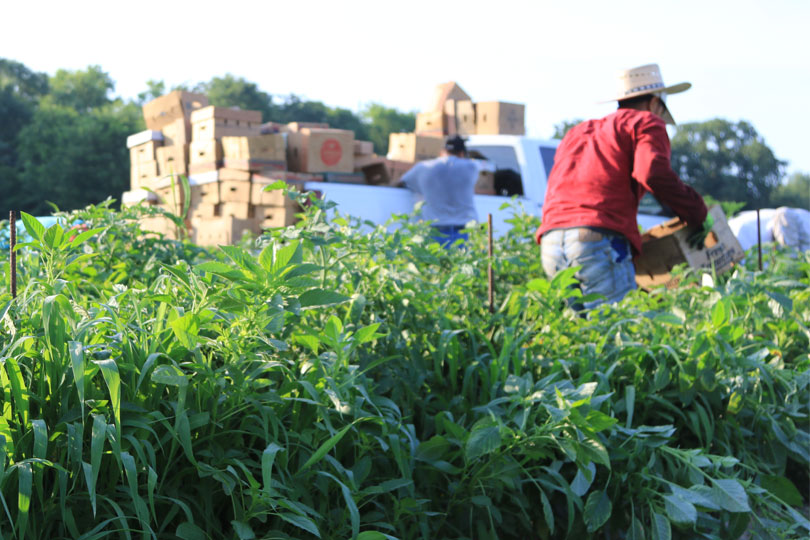By Jennifer Whitlock
Field Editor
The Farm Workforce Modernization Act (FWMA) was reintroduced in the 117th Congress by Reps. Zoe Lofgren (D-Ca.) and Dan Newhouse (R-Wa.). It passed the U.S. House of Representatives on March 18.
Despite some provisions in the bill that align with American Farm Bureau Federation (AFBF) policy goals, there are several issues, in its current form, that must be addressed before it can gain Farm Bureau support.
“Texas farms and ranches are part of the vast network that brings food to tables in American households and around the world. We need a solution that modernizes and reforms our current guestworker program to meet the needs for farms and ranches of all sizes,” TFB National Legislative Director Laramie Adams said. “There are some good points in this bill, but there are key issues left unaddressed that we would really need to see some progress on before we can get behind this legislation.”
Ensuring the costs of using a guestworker program do not impede a farm or ranch’s viability is crucial. As it is written, FWMA would limit wage increases over the next 10 years. But the program is already too costly for many farmers and ranchers to use.
The adverse effect wage rate (AEWR), or the rate employers must pay to H-2A workers, increased nationally by 20 percent in the last five years. In Texas, it is up 12 percent from 2016 to 2021—nearly six times the U.S. inflation rate for the same time period.
Higher labor costs, increased costs for inputs like feed or fertilizer and decreasing commodity prices over the past several years is a recipe for calamity for American agriculture.
“Farmers and ranchers already pay fair and competitive wage rates to H-2A workers and take good care of their employees, in many cases providing housing and transportation to and from their home countries. Our farmers and ranchers are known to treat their employees like part of their own family. This bill locks in drastic increases to AEWR and allows a new wage methodology to take action after 10 years,” Adams said. “If American farmers and ranchers—particularly fruit and vegetable farmers—are to remain in business, they must be able to compete with imports from countries where wages are much lower. We have to find a balance and create a market-based cost structure for H-2A.”
Wage increases also often have the unintended effect of harming the people they’re supposed to help, he added. They can lead to increased consolidation as smaller businesses fold under the higher costs. Other farms may turn to more mechanization to meet those labor needs, reducing the number of farm jobs in the long term.
And portions of the proposed legislation could have other negative consequences to American farmers and ranchers, Adams cautioned.
The bill grants H-2A workers a federal private right of action, despite H-2A workers already having an administrative means of addressing and resolving employment claims.
That’s because the H-2A program was designed by Congress to be carefully regulated by the U.S. Departments of Labor, Homeland Security, State and Justice, Adams said. Federal agencies already investigate violations, award back-pay to workers and penalize employers who violate the H-2A program.
FWMA would establish a mandatory nationwide E-Verify system for all agricultural employment within less than three-and-a-half years. But without first assuring a workable guestworker program is in place, Adams noted the impact on farms and ranches could be severely negative.
“We must ensure there is adequate time to get a new H-2A program implemented correctly before E-Verify kicks-in. Also, mandatory E-Verify without fixing some of these other issues first would be disastrous,” he said. “Studies have shown enforcement-only immigration reform could cause agricultural production to drop by $60 billion and food prices to rise 5 to 6 percent. That’s just not sustainable for farmers and ranchers, and it’s not sustainable for American consumers, either.”
Legislators are aware of these concerns, and many are working to seek satisfactory resolutions to issues faced by modern farmers and ranchers, Adams said.
“It’s been 30 years since any significant immigration reform was passed. That’s too long. The world and our nation are in a completely different place now than we were 30 years ago,” he said. “Our goal this legislative session is to work with our lawmakers and industry partners to ensure we can finally achieve an ag reform bill that provides stability for farmers, ranchers and their employees. In its current form, this bill does not quite meet the mark, however we are ready and willing to address issues. We are proactively working leaders in D.C. to help them understand the challenges and needs of Texas agriculture, and we’re very hopeful we can get it done this time around.”


I agree that too many pieces of legislation focus on regulation and enforcement without providing the policy to support the needs of the economy and the people. How do we get a more comprehensive look at issues facing those who provide and those who need food?
This article decries the fact that food prices may go up. If I understand correctly, people in other countries pay a larger percent of their income on food. Food is essential. US citizens may be spoiled at having lower food prices.